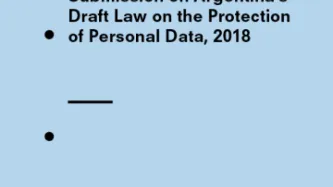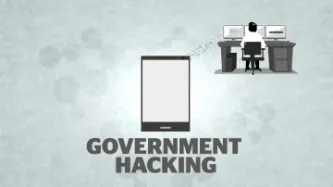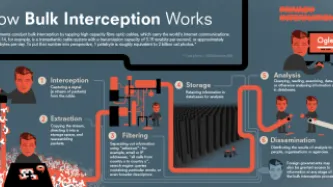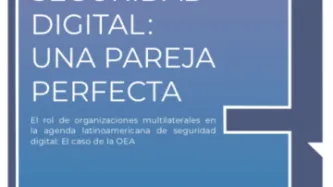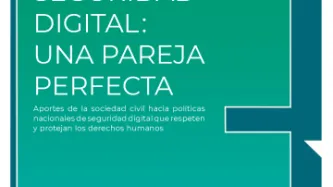Search
Content type: Advocacy
In September 2018, the National Executive sent the proposed Data Protection Bill to the National Congress. The proposed law was directed to the Senate and it will be considered by two commissions: the Commission of Constitutional Affairs (Comision de Asuntos Constitucionales) and the Commission of Rights and Guarantees (Comision de Derechos y Garantías).
Privacy International welcomes the continued efforts by Argentina to provide protections for the right to privacy, already enshrined in the…
Content type: News & Analysis
Creative Commons Photo Credit: Source
In September 2018, a month after Argentina lawmakers voted against the legalisation of abortion, we spoke to Eduardo Ferreyra from the Buenos Aires-based Asociacion por los Derechos Civiles about the role of privacy in the abortion debate. Also joining us in this second episode of the Gender and Privacy Series is Ambika Tandon from the Centre for Internet and Society in India to discuss the intersection between privacy and bodily autonomy.…
Content type: News & Analysis
Privacy International notes a recent ruling issued by Italy’s Supreme Court (Corte di Cassazione) that addresses the need to limit government hacking powers for surveillance purposes and articulates required safeguards when hacking is conducted as part of a criminal investigation.
The ruling addresses the appeals of several individuals involved in a case of corruption; the appeals challenge irregularities in the collection of data as part of the criminal investigation, which resulted in the…
Content type: News & Analysis
Image attribution: By Blue Diamond Gallery CC BY-SA 3.0.
In March 2017, when the UN Human Rights Council requested the High Commissioner for Human Rights to prepare a report on the right to privacy in the digital age, including the responsibility of business enterprises, Cambridge Analytica was an obscure company among others. A year later the data exploitation scandal erupted, leading to plenty of soul searching by politicians in US, UK, Europe and elsewhere, pledges of…
Content type: Long Read
This piece was originally published in Just Security.
Earlier this month, the European Court of Human Rights issued a major judgment in three consolidated cases challenging the U.K. government’s mass interception program, which was first revealed by Edward Snowden in 2013. That judgment finds notable deficiencies in the legal framework governing mass interception, rendering the program unlawful under Articles 8 and 10 of the European Convention on Human Rights (ECHR), which protect the rights…
Content type: News & Analysis
Today was a big day for the privacy of millions of people. The European Court of Human Rights has today ruled that UK laws enabling mass interception of our communications violate the rights to privacy and freedom of expression. This finding is an important victory for human rights and the rule of law.
The judges found that:
The UK’s historical bulk interception regime violated the right to privacy protected by Article 8 of the European Convention on Human Rights (ECHR) and to free…
Content type: Long Read
The European Court of Human Rights ruled today that the UK government's mass interception program violates the rights to privacy and freedom of expression. The Court held that the program "is incapable of keeping the 'interference' to what is 'necessary in a democratic society'". This finding is an important victory for human rights and the rule of law. Below, we break down the key parts of the decision.
The Court's ruling comes after a five-year battle against two UK mass surveillance…
Content type: Press release
The European Court of Human Rights has today ruled that UK laws enabling mass surveillance violate the rights to privacy and freedom of expression.
Judges found that:
The UK’s historical bulk interception regime violated the right to privacy protected by Article 8 of the European Convention on Human Rights (ECHR) and to free expression, protected by Article 10.
The interception of communications data is as serious a breach of privacy as the interception of content, meaning the UK…
Content type: News & Analysis
In order to uphold the law and keep us safe, the police can seriously interfere with a range of fundamental human rights. And so transparency and public scrutiny of their actions are essential to protect against misconduct and abuse.
So why is the National Police Chiefs’ Council (NPCC) now permitted to operate in secret?
We all have the right to seek information from most public bodies – including the police – under the Freedom of Information Act (FOIA) 2000. When the law was first…
Content type: News & Analysis
Actualmente, las empresas tecnológicas se encuentran inmersas en constante cambio. Uno de ellos es la creciente importancia que ha cobrado la seguridad digital, convirtiéndose en una prioridad. Que un emprendimiento resguarde su seguridad digital significa que puede gestionar los riesgos asociados a mantener la confidencialidad, integridad y disponibilidad de su información.
En este contexto, resulta de gran relevancia que las personas responsables del emprendimiento digital y el…
Content type: News & Analysis
El objetivo es facilitar a la sociedad civil una guía para la navegación de este organismo, efectuar un diagnóstico que permita situar cualquier persona interesada sobre la actualidad de la temática a nivel regional y descubrir la agenda de seguridad digital que sostiene la OEA en el continente.
Finalmente, concluimos con una serie de breves recomendaciones dirigidas a los organismos de la OEA. Con ello, esperamos que este órgano reconozca el papel que puede jugar como catalizador en el…
Content type: Report
La seguridad digital es una discusión crítica y hay que reconocer que la sociedad civil y los grupos de interés público no han sido suficientemente considerados. Como respuesta, varias organizaciones de la sociedad civil de América Latina se unieron para presentar informes que recuerdan a las entidades estatales responsables de formulación de políticas públicas que la seguridad digital debe tener en cuenta la seguridad de las personas y los derechos humanos. Presentamos la serie, Derechos…
Content type: Long Read
As we said before, Facebook and Cambridge Analytica scandals are a wake-up call for policy makers. And also a global issue. People around the world are concerned by the exploitation of their data. The current lack of transparency into how companies are using people’s data is unacceptable and needs to be addressed.
There is an entire hidden ecosystem of companies harvesting and sharing personal data. From credit scoring and insurance quotations to targeted political communication, this…
Content type: Long Read
Today Privacy International together with 27 other organisations from across Europe urge European governments to strengthen the protection of privacy and security of online communications. The proposal to reform e-privacy in Europe was launched in January 2017. However, despite the clear and urgent need of this reform, recently demonstrated by the Facebook/Cambridge Analytica case, the negotiations by EU member states have been inconclusive. Worse still, some governments seem willing to…
Content type: News & Analysis
Written by Privacy International
07:06: Camille’s smart pillow sends a signal to her smartphone that it’s time for her to wake up. She checks the quality of sleep on the app – last night was not great. Because the pillow tracks the motion in her bed, the company knows what else she may (or may not) have been up to. But the company doesn’t just track her when she is in bed. By downloading the app, Camille has also authorised access to her location wherever she goes, her camera, her contact…
Content type: News & Analysis
Written by Privacy International
08:27: Jen gets on the London Underground to go to work. She uses her contactless debit card to pay for the tube, so Transport for London knows where she is travelling to and from and her bank knows when she takes the tube.
08:36: The public WiFi on the tube means that even when Jen doesn’t connect to it, her every step inside the underground is tracked. The data will eventually be sold to advertisers.
08:58: Jen arrives at work. As with all the lower…
Content type: Long Read
To celebrate Data Privacy Week, we spent the week discussing privacy and issues related to control, data protection, surveillance, and identity. Join the conversation on Twitter using #dataprivacyweek.
Do you live in a “smart city”? Chances are, you probably do (or at least your city claims to be). But do you know what exactly makes your city “smart”, beyond the marketing term? And what does this have to do with privacy?
Companies and governments will tell you that the more cameras, sensors…
Content type: Long Read
To celebrate International Data Privacy Day (28 January), PI and its International Network have shared a full week of stories and research, exploring how countries are addressing data governance in light of innovations in technology and policy, and implications for the security and privacy of individuals.
According to the World Bank, identity “provides a foundation for other rights and gives a voice to the voiceless”. The UN Deputy Secretary-General has called it a tool for “advancing…
